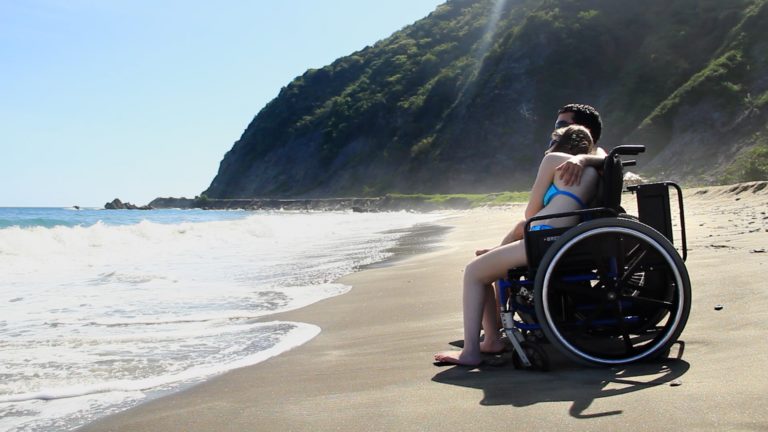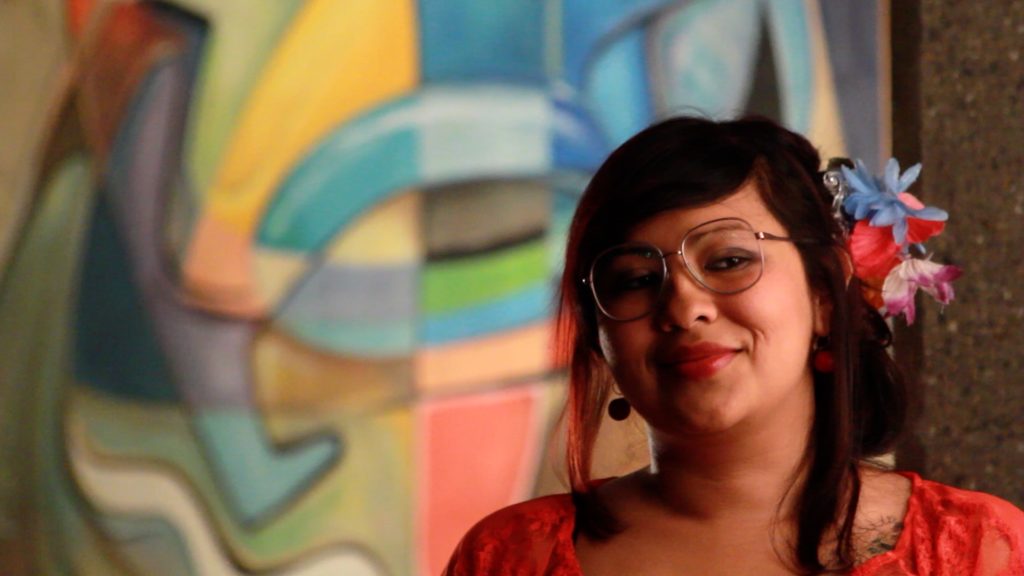Sex Assistant: a Venezuelan Short Film About Sexuality in Disability
Andrés González Majul and Daniela Berlet Rendiles tell the story of their sex life as a couple in wheelchairs in a 20-minute-long film which is already winning awards. This is the story of how it was made


Photo: The Sex Assistant Team
A version of this piece was originally published at our sister site, Cinco8.
Andrés González Majul and Daniela Berlet Rendiles have known each other since they were exercising at the same physical therapy center in La Trinidad, Caracas, back in 1995. Both of their lives have been in wheelchairs. In 2012, they began a relationship, sharing their artistic tastes and their interest in audiovisuals.
Their sexual history is the core of the short film Sex Assistant, directed by Andrés and produced by both. In late March, the short won the 7mo Festival Franco-Venezolano de Cortometrajes a Corto Plazo 2021, sponsored by the French Embassy in Venezuela with support from the Festival Cinelatino of Toulouse.
“The first person to help us was a whore,” says Daniela at the start of their account, in the documentary. Then they hired a physical therapist who would also time them and mechanize the act. Finally, with help from Venezuelan artist Desirée Chique, they managed the sexual assistance they were hoping for, while also merging art with cinematic production.
“The idea came from the need to see ourselves and recognize ourselves, as if unfolding who you are and seeing the act in the cold light of day. This idea of wanting to tell our story had been brewing within Daniela for a very long time, but we never thought the project would have this result,” explains González Majul, for whom the short is an act of acceptance and spiritual liberation.
A Long Relationship With Film
Sex Assistant is the debut production of the Fundación Daniela Berlet (FUNDABER, which promotes the independent daily life of people with functional disabilities), and the new chapter of her extensive career—Daniela is a community manager and host for advertising campaigns featuring disabled people. FUNDABER, through its Visión a la Cotidianidad program, has collaborated with other documentaries addressing the disabled community, like Yo Existo and Como nos vemos; Andrés González is also focused on photography and media, he’s been a member of the Círculo de la Cucaracha since 2018, a member of the Nelson Garrido Organization, and a singer for the Venezuela Big Band Jazz, affiliated to the Sistema Nacional de Orquestas y Coros Juveniles e Infantiles de Venezuela.
Andrés also has type II spinal muscular atrophy (SMA), which affects the neurons in the spine; Daniela’s condition is spastic diplegia, a type of children’s cerebral palsy.
None of this stops them from enjoying museums, art galleries, music and movie theaters, though, and these interests helped their short to be featured on the 9th International Film Festival in Balneário Camboriú, Brazil, and receive nominations in the Madrid Indie Film Festival, and in the Short Film Factory in Romania. In 2020, it received the audience award in the 4to Concurso de Cortometrajes of the Escuela Nacional de Cine (Venezuela). The screening list goes on.

“This idea of wanting to tell our story had been brewing within Daniela for a very long time, but we never thought the project would have this result.”
Photo: The Sex Assistant Team
“A fun fact,” Daniela says, “is that the film premiered at the Viña del Mar Festival, on September 12th, 2019, the same date of the foundation’s legal birth. It came as a very special birthday gift for (FUNDABER).”
Finding the Tone for a Unique Story
The twenty-minute short was filmed over five years.
“My own exploration with video-art, wanting to see yourself in the process, is a seed planted by German artist and poet Dieter Roth, when I saw his daily journals in MoMA exhibit from 2004,” Andrés says. His aesthetics were also influenced by Frank Moore and Arthur Zmijewski, both disabled creators. Moore was an American poet, painter, musician, and performance master who, unable to talk and in a wheelchair, created his own communication system. Zmijewski, on the other hand, is a Polish visual artist, filmmaker and photographer, who works on the body limitations of the nude aesthetic—his short An Eye for an Eye (1998), a performance by amputees, caught Andrés’s interest.
Another influence was Chris Marker’s documentary Sans Soleil. “I realized it didn’t have a journalistic focus, at all. It’s very sensorial, very abstract. I loved it. I wanted our short to have that abstract quality, and to achieve it, the intimate scene was important, the final scene. That was the big challenge.”
The balance between the discursive (through interviews off camera) and the poetic comes off as the fusion of ideas between both producers.
“My biggest motivation,” Andrés says, “was to tell the story from an aesthetic, artistic, and photographic sensibility.” He didn’t want romance to be the main plot element. “If we didn’t expose love in an explicit manner, I knew it would come up anyway. I ended up realizing, thanks to the help of others who helped during production (like Venezuelan film director Marcel Rasquin), that Daniela’s voice is very powerful. The movie has its own poetic stroke, which is what I wanted.”
There’s a scene where a scar is visible on Daniela’s naked body. “Daniela felt self-conscious about that scar, but I love it,” he says. “It made her unique to me.” Daniela now sees those scars as a bigger source of artistic inspiration.

Desirée Chique, the other key player on the production team.
Photo: The Sex Assistant Team
“Sex Assistant was based on our reality, and had its ups and downs, just like life,” Daniela says. “Cohabitation with our families was affected, especially in my case. I was born in a family with very solid principles, very conservative, and I guess I’ve always wanted to make a difference—so I’m very happy about the reception that Sex Assistant has gotten so far, I’m very grateful, both from a personal and a professional point of view.”
“A film takes a life of its own, its own expression, and its own path,” Andrés says. “There were times when Daniela and I would get lost. We were exhausted. I have no idea how many feet of film we shot that was unusable, it was a lot of trial and error, but there was a lot of perseverance, too.”
For Andrés, a spiritual catharsis began towards the end of production. “We felt that inner transformation that we were looking for. I’m surprised at how many of the images in the film were somehow in my subconscious, as if it was predestined, particularly in the final scene. I’m very grateful it happened, because it took a lot of effort to digest what we were doing. It was tortuous emotionally and spiritually, but it was for the best.”
Andrés and Daniela have now taken different paths, with maturity and pragmatism. I asked him if the film had anything to do with the break-up. “Not at all, not one bit. The reasons have nothing to do with sex, disability, or the film. The important thing was to move forward, and that doesn’t take away our pride and the enjoyment we get from this achievement.”
“We’re very proud of the movie. We had the courage to share something very intimate, to consummate true self-acceptance. And my hat’s off to Daniela. She’s the hero of the film. I wanted it to be that way from the beginning—and the other hero is Desirée, her role was very brave.”
Caracas Chronicles is 100% reader-supported.
We’ve been able to hang on for 22 years in one of the craziest media landscapes in the world. We’ve seen different media outlets in Venezuela (and abroad) closing shop, something we’re looking to avoid at all costs. Your collaboration goes a long way in helping us weather the storm.
Donate




